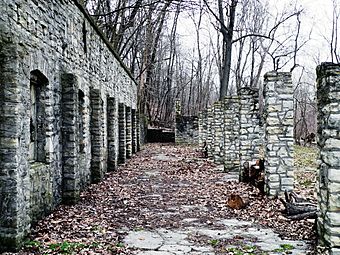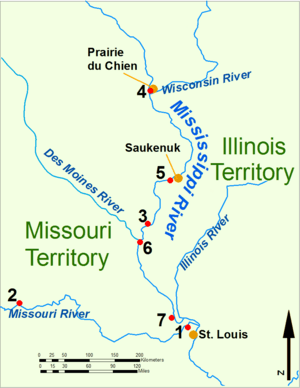Fort Belle Fontaine facts for kids
Quick facts for kids |
|
|
Fort Belle Fontaine
Cantonment Belle Fontaine |
|

Resort ruins in March 2005
|
|
| Location | Fort Belle Fontaine County Park St. Louis County, Missouri |
|---|---|
| Built | August 10, 1805 |
| NRHP reference No. | 16000031 |
| Added to NRHP | February 23, 2016 |
Fort Belle Fontaine (also known as Cantonment Belle Fontaine) was a very important U.S. Army base. It was located in St. Louis County, Missouri, near where the Mississippi River and Missouri River meet. This fort was the first U.S. military base built west of the Mississippi River. It was in the new Louisiana Territory that the U.S. had just bought. The fort served as a starting point for many important trips into the American West.
The Fort's Story

Fort Belle Fontaine was first a Spanish military post. It was built on the south bank of the Missouri River. After the Louisiana Purchase, the United States took control of the area. A treaty was made with the Native American Sac and Fox tribes in 1804. After this, the fort became a fur trading post for the U.S. government.
From Trading Post to Military Base
The fur trading post stopped operating after 1808. From 1809 to 1826, the site became a full-time U.S. military fort. During this time, from about 1809 to 1815, it was the main headquarters for the Army in the Louisiana area. It was also the regional Army headquarters during the War of 1812.
The fort had "sister forts" that helped control trade and protect the area. Fort Osage was along the Missouri River near modern Kansas City. It helped control trade with Native American tribes to the west. Fort Madison was in what is now Iowa. It helped control trade on the Upper Mississippi River.
Protecting History
Today, part of the fort's original site is saved as the Fort Belle Fontaine County Park. This park is part of the park system in St. Louis County, Missouri. An important archaeological site linked to the fort was added to the National Register of Historic Places in 2016. This means it's a special place that is protected because of its history.
 | William M. Jackson |
 | Juan E. Gilbert |
 | Neil deGrasse Tyson |


